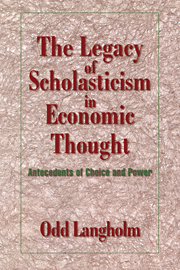Book contents
3 - The Augustinian tradition
Published online by Cambridge University Press: 13 March 2010
Summary
St. Augustine on compulsion, the will, and sin
In late antiquity, classical Greek thought on the subject of compulsion and the voluntary spread through different channels and was developed in other schools besides that of Roman legal philosophy. Thus, at the hands of the Stoa, the rationalistic idealism of the Socratic tradition shrank to a philosophy of detachment, according to which virtue becomes reconciliation to the inevitable. There may still be a strange echo of Aristotle in some of these utterances of Epictetus: “Externals are not under my control; moral choice is under my control.” A man has a moral purpose free from constraint. A threat of death does not in itself compel a man, but his will, the fact that he yields to the threat. Moral purpose compels moral purpose. “There rises up no thief of his moral purpose, nor any tyrant over it.” The direct influence, however, of these and other expressions of post-Aristotelian philosophy on medieval thought on this subject pales in comparison to that which was received through, or from, the Church Fathers and, above all, from St. Augustine.
Augustine's influence was conceptual as well as doctrinal. We shall be concerned with those aspects of his thought on compulsion and the voluntary that influenced medieval canonistic and theological doctrine of sin and culpability. For this purpose, it is useful to place in evidence some frequently quoted texts. Questions concerning the will – man's will, God's will, and man's will in relation to God's will – so completely pervade Augustine's thought that to quote him piecemeal and out of context, as we must do here, is sometimes to risk misconception.
- Type
- Chapter
- Information
- The Legacy of Scholasticism in Economic ThoughtAntecedents of Choice and Power, pp. 43 - 56Publisher: Cambridge University PressPrint publication year: 1998

